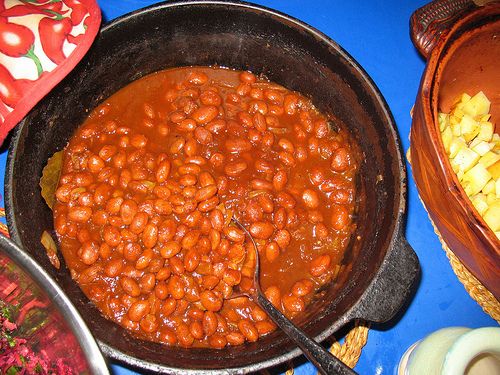Can you freeze baked beans? A homemade pot of baked beans brings comforting goodness to the tummy and satisfying flavor to the mouth. Also, there are usually leftovers. Tons of leftovers. Thankfully, freezing baked beans to eat them later is an option.
Can You Freeze Baked Beans?
You can freeze pretty much any food. The real question here is whether freezing baked beans makes sense. Fortunately, if you go about the freezing process the right way, the results should be good enough. In other words yes, you can freeze baked beans to use them later on. So if you ever see a sale or are able to get a decent deal on baked beans, don’t hesitate and stock up.
How to Freeze Baked Beans?
When it comes to homemade baked beans, it’s best to freeze them the same day they were made. This way they will retain their flavor and freshness. Plus you will be sure they are safe to eat, that is they didn’t start to go bad yet.
If you have leftover canned baked beans, the sooner you freeze them, the better. Remember to never freeze unopened cans of baked beans. The canning process does a great job of preserving the beans. But once you’ve opened the can and got some leftovers, feel free freeze them.

Before packaging the beans make sure they are cold. That means if you’ve just made them, leave the leftovers on the counter until they cool down. You can speed up the process by putting them into the pantry or giving a cold bath. The last one makes sense if you really want to go through the whole freezing thing quickly and be done with it.
Okay, you have cold baked beans, now it’s packaging time. You can use freezer-safe containers or jars, or freezer bags. Choose whatever makes more sense. Bags will usually take less space in the freezer. If you’re short on space, they’re the obvious choice. Also, bags allow you to divide your baked beans into many portions. If you decide to go with freezer bags, consider how much beans you will need for future meals and pack accordingly. You can always pack half or third of a bag and squeeze out the remaining air so the bag takes as little space as possible. Speaking of space, if you use jars or containers, make sure they end up being almost full. Just an inch of head space so the beans won’t blow them up when the liquid expands.
Next step is to label the containers or bags. Make sure you put the name and date on them for future reference. That’s especially important if you have a lot of food in the freezer so it’s not an issue finding those baked beans when needed.
One thing that we didn’t cover is how long those beans can be stored in the freezer. The scientifically accurate answer is: indefinitely. As long as the temperature in the freezer is at 0 or below, nothing bad will happen to frozen baked beans. The real question is how long it does make sense to keep them in the freezer. There’s no good answer to this question. Frozen products tend to slowly deteriorate in taste and texture. So the sooner you thaw and eat them, the better. Generally speaking, baked beans should be fine in taste for up to six months in the freezer. Don’t expect them to be exactly as good as they were fresh though.
Remember, the longer you stored the baked beans before freezing, the shorter their shelf life once you thaw them. Freezing won’t magically make your food fresh and better.
The same method works for freezing refried beans, risotto, or chili.
How to Defrost and Reheat Baked Beans?
When it comes to baked beans, thawing overnight in the fridge is the way to go. Alternatively, you can toss the container or bag into cold water. In that case thawing should take 4 to 8 hours, so if you do it in the morning, beans should be ready to reheat for dinner.
Thawing in a saucepan on the stovetop or in a microwave are your tools of last resort. If using either of those, make sure to add some water and pay attention so your food won’t dry out completely. The results of thawing this way are less than optimal so use them only if you have to.
Once thawed, reheating on the stovetop on medium or low heat is the way to go. It shouldn’t take longer than 10 minutes, depending on how much beans are there. Serve them as they are or as a side dish.
Important thing to note is that you should continue playing with the cooking, thawing, and reheating process until you master it. For example, if the beans are too dry after reheating, you can try adding some water next time. If you’re freezing your homemade baked beans, play with the recipe so they are more of less moist after cooking and see how that affects freezing and thawing.
One last note, never thaw and reheat food more than once. That means when you take something from the freezer and thaw it, you either eat it or toss it out. Freezing multiple times can cause food poisoning and you don’t want to experience that.
Summary
Freezing baked beans is safe and an effective method for preserving your baked beans to eat later when you are ready.